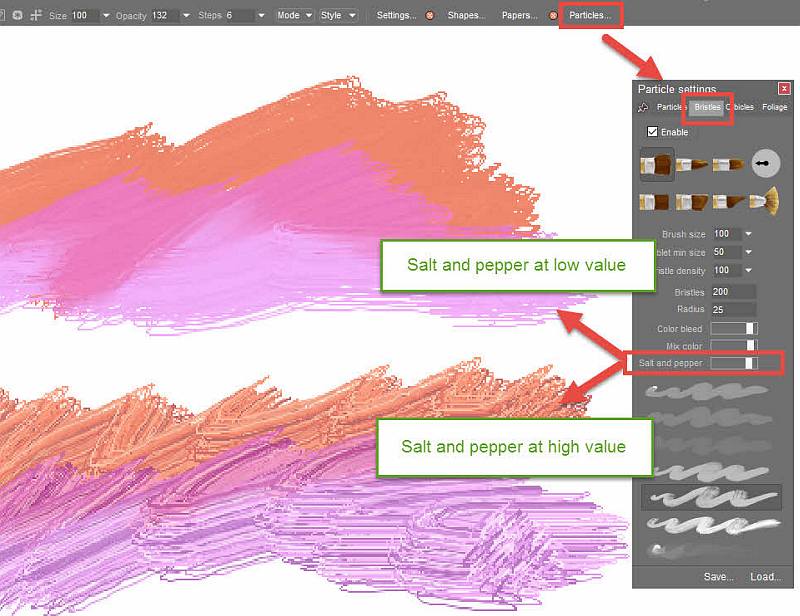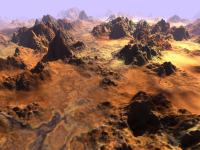|
Back to PD Artist top


| Learn more: |
| Get ready to
waffle! System Requirements |
| I'm new to
Dogwaffle... What was new in v6 What was new in v7 What was new in v8 What was new in v9 What was new in v9.5 totally new to Dogwaffle? What was new before |
| I want it now! Ordering Info |
change
| What is PD Artist? PD Artist is digital painting software for PCs running Microsoft Windows, powered by Project Dogwaffle. It is priced more affordably than its full-featured big brother, PD Howler. What it doesn't have is the tools for working on animation and video (with one exception: you can have animated brushes). If you don't work on animations, PD Artist may be a smarter solution for you. Why pay money for tools you won't use? Here are a few links to features and galleries. Mostly done in PD Howler, but also possible in PD Artist for the most part. Just ignore the animation side, and you've got roughly what you can do with PD Artist. As of PD Artist 11.2b: Some Paint features: - Natural media, many presets, fully customizable - Full tablet support - Custom brushes, bristle brushes, particle brushes, brushes under the influence of force fields - 3D orbiting particle brushes (Orbicles) - Dynamic Rules-based Foliage brushes - Animated (multi-frame) custom brushes - Pigment lifting for even more realistic paint effects - Well over 100 fast full featured filters. Real-time is our middle name. See below for more on Filters - Premium color mixing tools. Red-yellow-blue, palette mixer, lots more. - Multi-monitor support - Mirror mode and Symmetrical painting, Kaleidoscope mode - Frame your artwork - brush keying Some tools from the Toolbar: - Natural Paint Brush tools - Flood Fill tool with many fill modes, patterns, gradients - Linear tool - Amazing Curve tool - Gradient tools, Lensflares, Special effects - Text tool - Rectangle tool (hollow/filled) - Ellipse tool (hollow/filled) - Alpha selection tools (magic wand, lasso, rectangle, oval...) - Custom brush selector / keying tool - color picker - viewing controls: move image, zoom, fit... - undo/redo and interactive (partial) undo - clear main image/Swap image - switch/set primary/secondary colors Sidebar: - previews of brush image, paper texture and image - many color picker/palettes - color swatches - layers (but no automatic alpha blended opacity) - grids and artist guides - Z-scale guide to adjust brush size based on Swap image in back File menu: - New/Open/Import - Browse/Batch browser, Recent documents - Save/Export/Close - Batch process, General File converter - Twain, Print with... Image menu: - Undo/Redo/Clear/Clear selected - Fill... - Store image copy (!) - Clipboard/Channels - Main/Swap image tools, Alpha, Mixing - Free transform - Flip, Rotate, Resample, Image size - Make seamless - Crop tool, Crop to selection - Greyscale..., Color transforms, Invert - Expand dynamic range - Gamma... - Image info - Frame your work Brush menu: - Use selected as brush - Open/Save - Store and manage copy... - Store as image - Free - Clipboard - Style/Transparency - Flip/Rotate - Resample - Premultiply correction - Make seamless - Add drop shadow - BrushFX (!) - Patterns - Animated brush - brush plugins Filter menu: - Fade Last action - Adjust - Color - Blur - Photographic filters - Sharpen - Convolve - Noise - Transform - Video - Cleanup - Artistic - Stylize - Render - All plugins - Combine with swap / Composite with swap - Displace by swap - Emboss by swap Selection menu: - Deselect/Select all/ Select numerically - Select by > Shadows/midtones/lights/color key - selection on/off, Invert selection, Store selection - Show marching ants, Overlay - Gaussian Blurr/Box filter - Grow/Shrink - Free transform selection - Selection fader tool, Adjust selection, Expand dynamic range - Flip selection - Paint on selection, Premultiply correction - Effects: Glow, drop shadow, Emboss by selection View menu: - Compact/fullscreen mode - Layout - Zoom - Fill settings - Gradient Editor - Sweep editor - Histogram - Particles - Plugin panel - Undo browser - Post adjustment - Settings - Penny Paint - Color - Utilities - Other - Tablet options - Rescue offscreen windows - Detect screen DPI Help menu: - Dogwaffle Community - Artist on the web - Artist manual (points to the Howler manual - just ignore tools for animation, except for animated brushes) - Keyboard shortcut reference - About Artist - Check for .Net Framework Below you will find a collection of images that can be created in PD Artist. They were either created in PD Artist, or in PD Howler, which has even more features than PD Artist. The images here though were created with features and tools also found in PD Artist, so you can create the same in PD Artist. (for the most part what makes the difference between PD Artist and PD Howler is that Howler can also do animations and work with video). Want animation? Work on Video clips? Go beyond PD Artist, use PD Howler Note: if you order PD Artist first, and later wish to add animated features, we offer a discount coupon to upgrade. It comes usually included with the downloadable delivery of PD Artist (or also of PD Particles) but you can also contact us to request your discount coupon based on your current latest version. The Interface of PD Artist 10:You may see a different look of the interface at first, after you install yours. This is because it is highly customizable, with various color schemes to choose from. Some palettes and toolbars can be made to be floating or stuck to the left or right of the screen. Here is part of the interface, with a dark background color, light color for text. The toolbar for Particle settings is showing on the right side. There are several categories of Particle brushes. The one showing here is Bristles, with the new Salt & Pepper slider, which adjust the level of embossing for the bristles. The image showing in this example was however created with another particle type: Orbicles. That type also can be tied to an audio source, hence the Audio meter showing in front of it. The sound level affects the size of the Orbicle brushes when enabled in this manner. Image 1 - A Raven contemplating the scene: The background landscape was completely created in PD Artist. (or PD Howler, same tool). PD Artist can quickly create landscapes from elevation maps. It also adds erosion, sediment elevation and sediment coloring. It then adds lighting with raytraced cast shadows, and can render it too with ambient occlusion shading. There is also a module for adding clouds and fog. The clouds are prebuilt. In PD Howler you can create your own in the Particle Modeler (which is animated and hence a tool that is not included in PD Artist). The grass near the bottom on the ground was painted with particle brushes (Optipustics presets for 'Baddy grass'). The trees to the left and right were painted with a single brush stroke each, using a particle preset from the 'Foliage' group. Notice that the raven and branch it sits on were blurred. That part of the image was in a separate layer, and even though PD Artist didn't do automatic apha-blended opacity, using the raven layer in Multiply mode works well enough to make it appear opaque, since when you multiply black pixels to any others from layers below, they turn black. Image 2 - Another Raven: The raven and tree came from a photograph which we took in our neighborhood and turned into a black and white, then placed in a layer on top of the background image. The bright glow and lensflares from the Sun in the upper left was also added in PD Artist. Image 3: Yet another raven and landscape Here's another example of a snowy landscape created with the 3D Designer filter, which starts from an elevation map to create renderings with erosion and sediments added by it. A slight blur for the foreground layer lets us focus on the beauty of the background scenery. Image 4: This image had several stages: background skies with clouds were hand painted. Then a mountain range that was created in 3D Designer was added. Then a lot of different rocks and foliage were added, painted in the mid and nearby front areas. Most of these are based on foliage brushes. Image 5: Another River Canyon This is another example of using the 3D Designer to create a landscape with sediments and erosion. In this case, something like a canyon. It also shows the 3 basic color levels that are based on the elevation: Grass (green) at the lower levels, Rock (grey) in the middle elevations, and Snow (white) in the upper peaks. Additionally, the sediments can be left unaffected and pick their coloration based on height and slope like the rest of the terrain, or they can be forced to one of the three main colors. In this case, the sediments were matched to Snow, which adds patches of snowy sediments here and there in lower elevations too. An image like this takes just a few seconds to create. Ok, perhaps a minute. With practice and experience ;-) If you want to learn the tricks about how to use the 3D Designer filter for creating images similar to this, watch the tutorial series in the "River Canyon" playlist of our YouTube channel: https://www.youtube.com/playlist?list=PLBqbdhU5umbfeOflrR0ukgjZe7kK1mOv0 Image 6: Here's another example of a landscape that start with a rendered mountain that came from the 3D Designer filter. There are various elements of bushes, grass and trees that were added below, and those are again based on brushes from the foliage brushes or general particle brushes. Image 7: Mystic fog, monolithic blocks This one was created with one of the earlier releases of the 3D Designer, which already had elevation fog but didn't have all lighting, shadow casting or erosion/sediment effects yet. It didn't need it. The clouds were not rendered at the same time as the bottom part of the scene, but rather composited later. Interestinly, a lot of interesting cloudy skies like this can be created in 3D Designer too. Image 8 - Lens flares Project Dogwaffle has several presets for various types of glowing lights and lens flares. Image 9 - Adding grass and foliage details nearby This is the same image as the prior one above, but we've painted some grass and bushes or small trees nearby. Using the foliage and particle brushes, this can be done in mere seconds. Image 10 - more landscape painting Using a mix of various grass and foliage settings for bushes, tufts and trees. Image 11: Big Moon The Moon came from a photograph we took, and stamped in screen mode over the sky and clouds. The landscape is of course created with the 3D Designer filter. There is also a nice lens flare for the bright star. Image 12 - particle brushes for grass, foliage brushes for bushes and trees Image 13 Another example of using particle and foliage brushes. Image 14 The landscape was rendered in Puppy Ray, the ray tracer from PD ARtist and PD Howler. The sun was added in post, and so was the light rays / shadows from the mountains nearby (using Mystic vision filter in Dark vision mode). Image 15 ANother rendering in 3D Designer, with added post for the lens flare Image 16 The mountain was created in 3D Designer, the sky too but in a separate rendering, and the two were then composited together. Image 17 The mystical side of Puppy Ray rendering. Image 18 Painting with various brushes Image 19 Bristle brushes Image 20 The helms of grass in the forground use a new feature that changes the size of the brush along the path. t's a post processing repaint effect, using a size-control envelope. Image 21 Starry effects. Image 22 More rendering with 3D Designer. Image 23 Using an alternate image (in the Swap buffer) to control the size of the brush. In this example, the controlling swap image goes white to black from buottom to top. The result is that the brush automatically changes its size as you paint across the range. Image 24 Just a few samples of brushes. Image 25 paper texture through the brush, and controlling the size with an envelope. Image 26 Salt and pepper, a new control for the bristle brushes. Image 27 Putting it all together. Image 28 paper texture through the brush, and controlling the size with an envelope. Going beyond PD Artist, with PD HowlerThe Howler edition of Project Dogwaffle is a superset of PD Artist. It includes all the same features PLUS traditional animation and working on video clips, such as for stabilization, motion predicted interpolation and repairing missing frames, an exposure sheet for traditional (frame by frame drawn) animation. Most of the filters can apply across the frames of an animation. 3D Designer and PuppyRay can also render across an animation! Discover PD HowlerDiscover PD Howler on Steam |
Paint, Motion, 3D & Visual
Effects:
PD Howler 11
Paint, 3D & VFX:
PD Artist 11
Slideshow
8.2 Showcase
8.2 Slideshow
8.2 Features
Buy Now
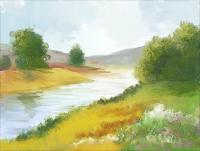

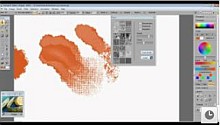


lifting of water color pigments
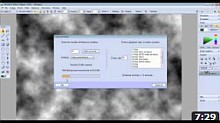

Removing details from a Photo
Particle and Foliage brushes:
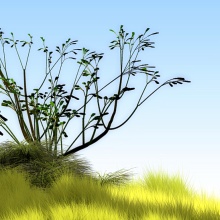
Foliage brushes:

Particles and Foliage brushes:

Spherize filter:

Managing a Custom brush:
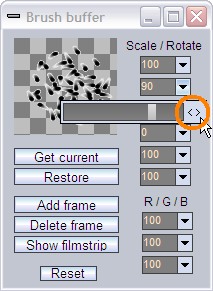
The Crystalize filter:
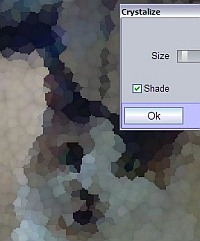
Legal





























